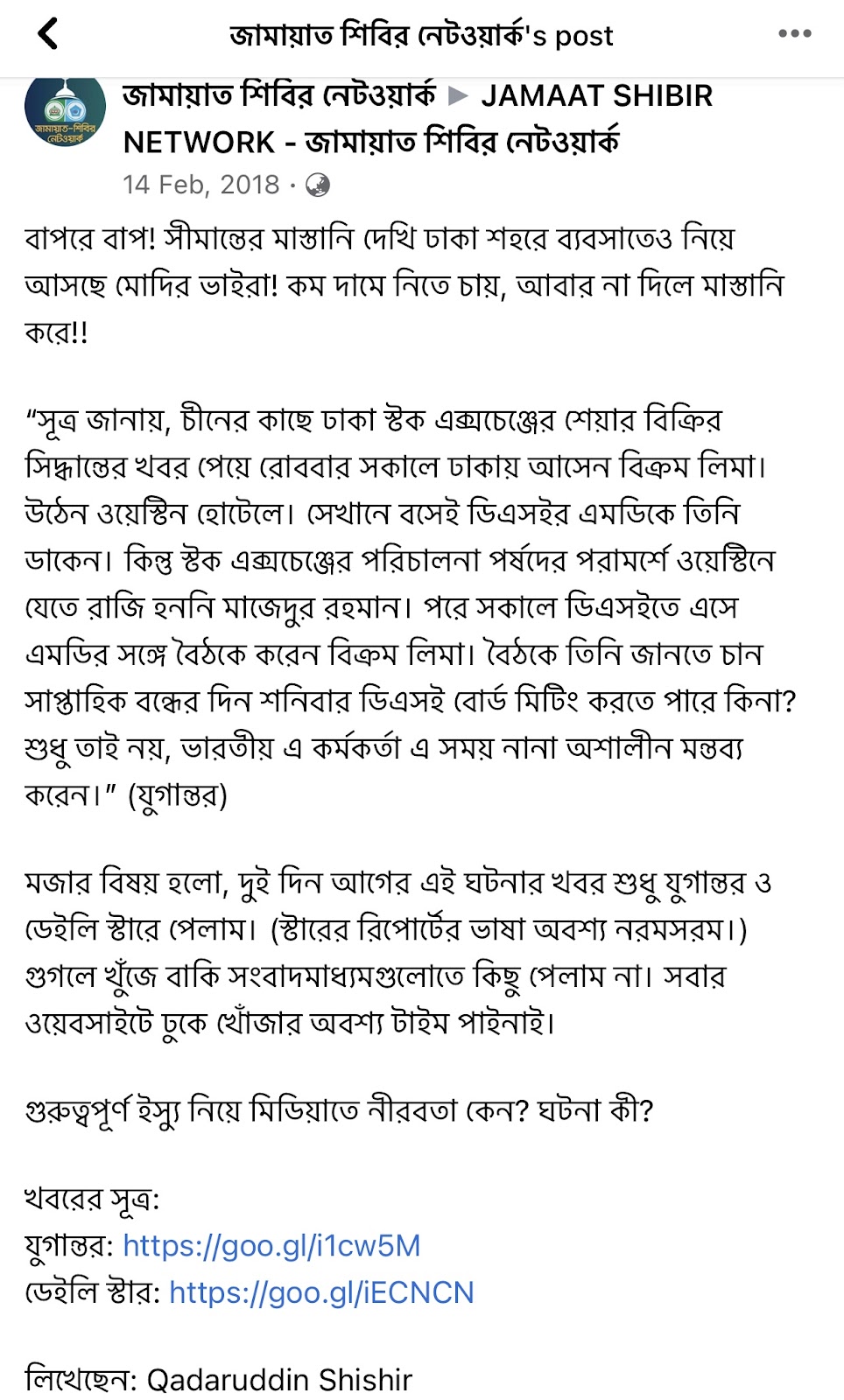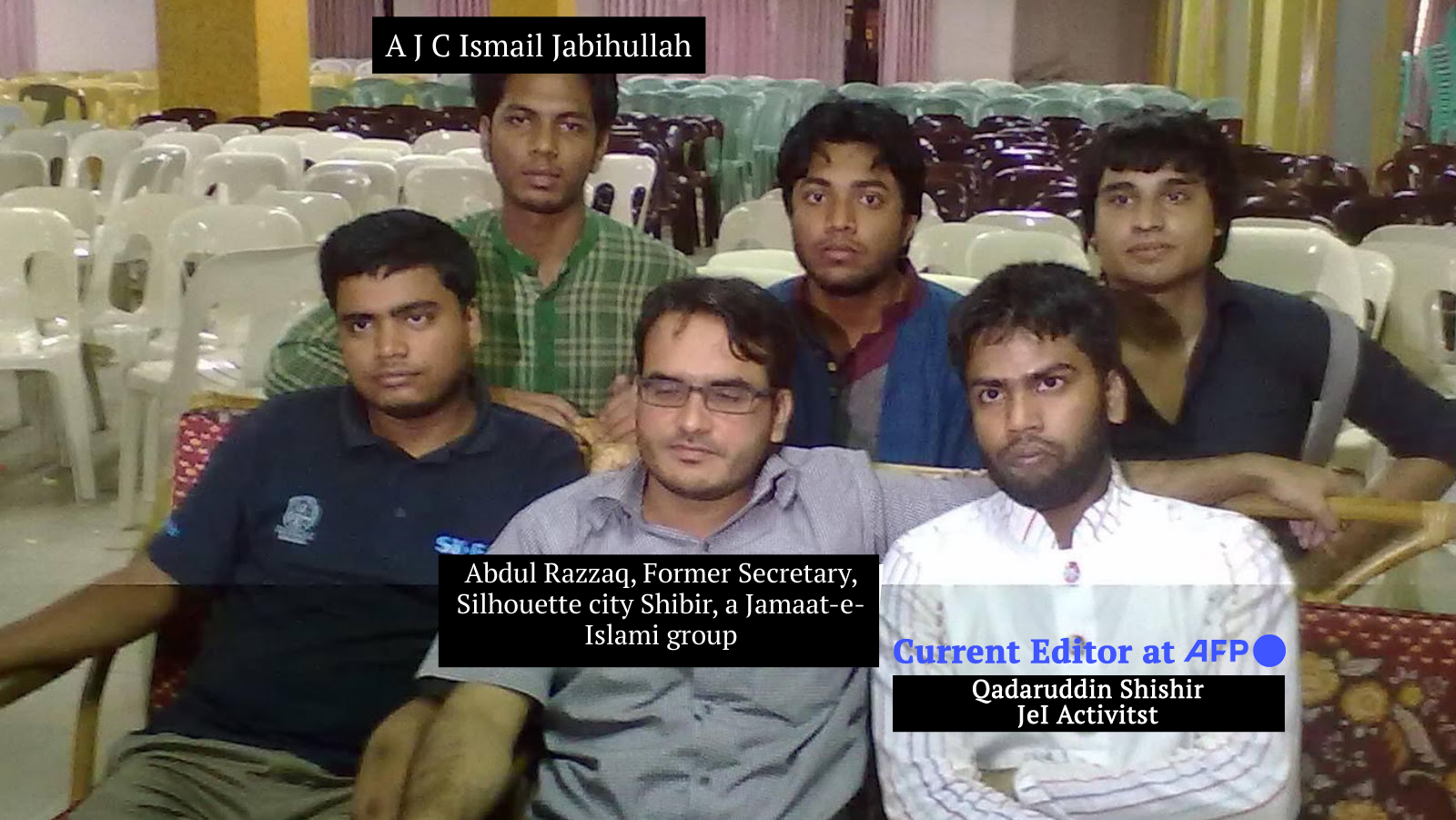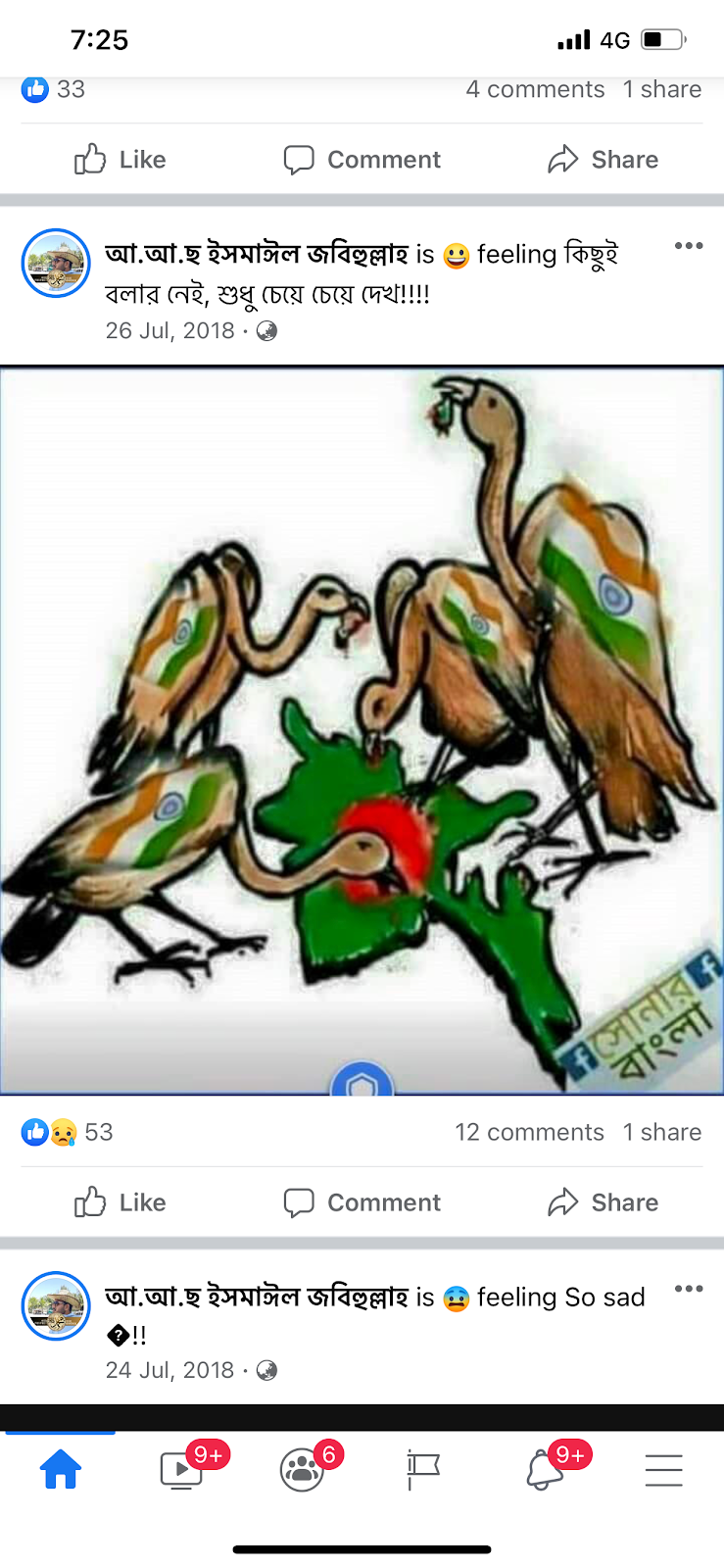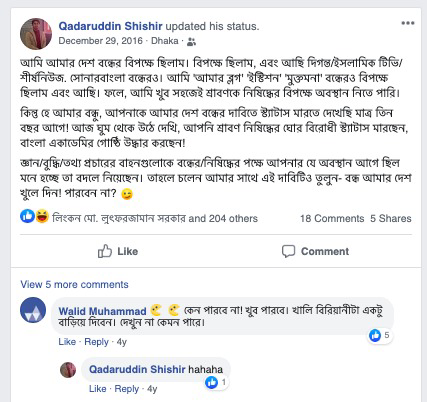Mahfuz Anam, one of the share-holding partners of a business conglomerate named ‘Transcom Group’ is an accidental journalist and editor whose debut in the world of journalism was as the Executive Editor of a newspaper named The Daily Star through the kindness of a veteran journalist named SM Ali, who had worked at UNESCO with Anam for years. Ali was having a dream of launching an English newspaper for years, before he succeeded in convincing owners of Transcom Group to invest a very large amount of cash, which would ultimately turn them into mighty media moguls in Bangladesh. But the surprising fact that no journalist or others have ever raised – wherefrom such a large amount of cash had suddenly landed into the possession of the owners of Transcom Group, when they were almost bankrupt and were facing tremendous trouble with their family venture – W Rahman Jute Mills in Chandpur town. Workers of this jute mills had lodged dozens of cases against the owners for non-payment of wages and violating labor laws thus forcing the owners – including Latifur Rahman — to appear in labor court in Chandpur on a regular basis. On the other hand, W Rahman Jute Mills was listed as one of the top defaulting enterprises with Bangladesh Bank (Central Bank) for long standing loans. Did they find the genie with the magic lamp that came from Jolpaiguri – their ancestral home in India with sacks filled with cash?
It is clearly huge mystery that deserves unearthing as while even in 1984 owners of Transcom were suffering from acute financial crisis – how did they suddenly become extremely wealthy after getting agency of ‘Nespray’ brand milk power – a of Nestlé S.A, a Swiss multinational food and drink processing conglomerate corporation headquartered in Vevey, Switzerland.
The launching of two newspapers almost simultaneously – The Daily Star and Prothom Alo by Latifur Rahman’s Transcom raised the eye-brow of many in Bangladesh as in the past none of the local entrepreneurs had shown the courage of launching two daily newspapers at a time with huge investment. Most importantly – Matiur Rahman, the editor of Prothom Alo and SM Ali, editor of The Daily Star succeeded in showing their commendable experience in turning both the newspapers grab leading position just within the span of months that made Latifur Rahman and his business partners in Transcom – extremely influential in the society.
According to web sources, due to such influential ownership of media projects, Latifur Rahman got the excellent opportunity of continuing various questionable activities – including tax evasion and money-laundering.
In 2018, Anti-Corruption Commission (ACC) had summoned Latifur Rahman on various allegations that also include acquiring illegal wealth, money laundering as well as land-grabbing. ACC officials told the media, “Latifur and his family have made billions by not paying utility connection bills and VAT of businesses under the group”.
Earlier, in 2015, Central Intelligence Cell of the National Board of Revenue (NBR) wrote letters to scheduled banks in Bangladesh seeking information on Transcom Group chief Latifur Rahman’s bank accounts and assets.
Finally, the entire issue was buried, possibly due to the huge influence of Transcom’s media monsters, which had in the past targeted several leading business conglomerates in Bangladesh – including Beximco Group.
It may be mentioned here that following the ouster of Bangladesh Nationalist Party (BNP) from power by military-backed interim government on January 11, 2007, Mahfuz Anam and Matiur Rahman became extremely influential due to their connections with most of the big brasses in the regime. Mahfuz Anam and Daily Star group managed to send its Executive Editor Syed Fahim Munayem as the Press Secretary to the Chief Executive of the interim government – proving, that interim government was very much under the influence of Mahfuz Anam and Matiur Rahman, who made frantic bids in sending BNP chief Khaleda Zia and Awami League chief Sheikh Hasina into exile and establish their permanent rule in Bangladesh by placing Nobel laureate Muhammad Yunus at the forefront as head of the government in Bangladesh.
After establishing their unchallenged influence over the interim government, Mahfuz Anam played lead role in Yunus’ attempt of floating a political party named – “Nagorik Shokti” (People’s Power), which ultimately fell flat due to lack of support of the masses. It may be mentioned here that, by using influence of Hillary Clinton and with collaboration of local affiliates such as Mahfuz Anam — Muhammad Yunus wanted to become a life-long head of the government in Bangladesh and turn the country into a fertile ground of rampant loot, corruption, money-laundering and other forms of illegal activities. A crook Yunus even had the ambition of forcing every Bangladeshi citizen to switch to his microcredit banking system from conventional banks, while he also had the agenda of turning state-owned banks into microcredit banks.
For decades, Transcom has managed to grab massive business benefits in Bangladesh mostly due to its owning of The Daily Star and Prothom Alo. They even did not hesitate in introducing fly-ash mixed cement in Bangladesh by replacing Portland Grey Cement – which may ultimately pose a serious threat to the country’s infrastructure projects.
Everyone in Bangladesh knows the news about cracks in the Jamuna Multi-purpose Bridge. But, possibly no one knows the fact that the main reason behind such cracks was due to use of a particular brand of cement, which in the name of Portland Grey Cement is in fact fly ash mixed lowest grade cement. And, this inferior quality of cement went into various high cost projects in Bangladesh just because; chairman of the company producing and marketing this brand is none but Transcom’s Latifur Rahman. No one in the government dares to utter even a single word about ‘Holcim’, which supplied such cement to various projects in Bangladesh, as they are afraid of wrath of Daily Star and Prothom Alo. Despite the fact that both the newspapers are largest in circulation in Bangladesh, the main purpose of these publications is serving the interests of Corporate Crime.
The Primary intention of Daily Star group is to stand against various business groups, whenever there is any business rivalry with that specific company or individual. This group went into heinous propaganda against Beximco Group, Bashundhara Group and many others in the past. There is even a clean track record of dubious behavior of this group sabotaging various projects in Bangladesh, with the ulterior motive of either supporting businesses of Latifur Rahman, Transcom or members of this syndicate.
Many projects were already sabotaged by this group, thus causing tremendous loss to Bangladesh’s economy. One of the prominent cases of such rivalry between the Daily Star group was with Bangladesh’s lone hard rock mining project at the country’s Dinazpur district.
Maddhyapara Hard Rock Mining Project (MHMP) became a prey of Daily Star for the past several years. According to media reports, some vested interest groups, including importers of stones and stone-chips from India, Myanmar and Malaysia were patronizing such media terror by The Daily Star, thus attempting to sabotage country’s most prospective project, which not only could save millions of dollars, but, also was set to turn into a huge prospect of earning millions of dollars from export of world-class Granite Tiles.
First rivalry with the MHMP began when the Bangladesh government appointed Polish consulting firm Kopex SA, defying the fact that this firm had no experience of hard rock mining. It is learnt that appointment of this Polish firm was a result of heavy persuasion from some high-level corrupt bureaucrats in the Energy Ministry and Petrobangla. From the very appointment, the Polish consultant had been frantically trying to sabotage the project for reasons unknown.
In June 2006, Kopex SA submitted a paper with the Energy and Mineral Resources Division saying, “Maddhyapara Hard Rock Mining project has become ‘virtually sick’ and the employer (the government) has suffered huge financial loss”.
It said Petrobangla and the project authorities, Madhyapara Granite Mining Company Limited, should ask Nam-Nam Corporation (a state-owned company of the Democratic People’s Republic of Korea) for final commissioning and test production immediately to ascertain the actual status of mine development.
“The Petrobangla and MGMCL should take over the mine after ascertaining its actual state and on documentation to establish the legal ownership of the mine”, it said.
Kopex said, “The Nam-Nam has completed major installation of the mine in over 12 years but they have not yet done the final commissioning and test run although the original development period of the mine was 6.5 years since the signing of the agreement between Petrobangla and the company in 1994”.
Sources in Petrobangla, however, ditched the Kopex report, saying that the consultant should also be held responsible for the delay as it failed to come up with a proper plan.
“Kopex also wants to be involved more with the mine for which it came up with such a report”, Petrobangla source added.
Meanwhile, on October 15, 2005, The Daily Star published a front page news item titled ‘North Korean company looks for legal coverage to finish task’. In this report, Daily Star said, “When completed, the Maddyapara hard rock mine will commercially sell 1.65 million tonnes of granite a year. The country annually imports 3.4 million tonnes of granite. Local production will save between $38 million to $58 million US dollars. The project has a life span of 45 years. However, the price of Maddhyapara granite will not be cheaper than the rocks that are commonly imported from India because of the increased project cost”.
It was clearly understood that the report was published with the very intention of killing the project to protect the interest of the importers-exporters syndicate, which enjoys business of millions of dollars every year by continuing to import stone from India and other countries. In this report, Daily Star claimed that the cost of production of MHMP hark rock was higher than imported one, which is nothing but a clean deviation from truth.
In 2009, it is learnt from dependable sources that, production cost for each tons of hard rock from Maddhyapara project stood at US$10 while the minimum import cost was US$ 22.
On May 18, 2006, Daily Star once again published a front page report titled “Petrobangla to take it over from DPRK firm”, where it repeated the same lie on the price of the locally extorted hard rock. It said, “Maddhyapara granite will however not be cheaper than the rocks that are commonly imported from India because of the increased project cost”.
North Korean company Nam-Nam Corporation successfully completed and handed over the project in May 2006 and while; commercial production in the project was already going on.
Being totally frustrated at the completion of the project, vested interest groups once again managed to publish another front page report in The daily Star on May 16, 2008 titled “Miner now wants return of non-existent loans”.
In this report, Daily Star wrote, “Nam-Nam is now operating the mine with 65 South Koreans under a one-year service contract due to expire on May 27. As it did not fully transfer the South Korean technology to the MGMCL, it will get yet another year’s service contract, the sources said”.
Commenting on the report, an official of Nam Nam Corporation said: “This report shows two things. One, the reporter knows nothing of the project but was writing thing being dictated by vested interest groups. In the same news, while the reporter said Nam-Nam is a North Korean company, how he could discover 65 South Koreans in the project (does he lack the minimum knowledge that North and South Korea do not have any diplomatic relations as yet?). The reporter also said that, Nam-Nam is not fully transferring South Korean technology to MGMCL. Ridiculous, who edits and passes such rubbish news in Daily Star? Being Dhaka’s leading dailies, it should be ashamed of such poor journalistic quality. The entire report as well as all previous reports is part of propaganda and conspiracy to kill the entire project, which stands as the most prospective one for Bangladesh. Anyone can easily understand that, vested interest groups, including enemies of North Korea are patronizing such dangerous campaign not only to sabotage the project, but, also to give a good lesson to the North Korean company for being dedicated and helpful to Bangladesh is saving millions of dollars from import of hard rock”.
Serious allegations against The Daily Star
Back in 2008, a number of Western media as well as Assam-based prestigious daily The Assam Tribune in reports claimed Transcom Group received funds from United Liberation Front of Assom (ULFA) for launching Prothom Alo and The Daily Star.
According to The Assam Tribune, during the rule of BNP-Jamaat coalition government, when Indian security agencies kept up pressure on Bangladesh to shut down enterprises run by ULFA, the militancy outfit succeeded in covertly expanding its business portfolios in the country.
In 2005 New Delhi had provided a list of businesses suspected to be run or funded by ULFA, along with a series of bank account details. In response, the BNP-Jamaat coalition government told New Delhi stating “none of the business entities could be traced”.
The Assam Tribune claimed, ULFA was having diverse business interests in Bangladesh ranging from driving schools, nursing homes, hotels to garment export houses to deep-sea trawlers.
The Daily Star editor Mahfuz Anam sent a rejoinder to The Assam Tribune denying allegations of his newspaper being funded by ULFA, which was published on August 28, 2008 – although the Assam-based newspaper has later removed Anam’s rejoinder from its online edition.
In the rejoinder, Mahfuz Anam said, Transcom was founded in early seventies and he admitted a fact stating he was included in The Daily Star as an Executive Editor by its founding editor S M Ali and he became the editor due to “untimely death of SM Ali” – proving, Mahfuz Anam is an accidental editor without any journalistic background.
That may not be the key issue as there are plenty of editors in the world – and even in Bangladesh, who joined this profession without any past experience. But the problem with such “editors” is – they do not hesitate in serving the purpose of any vested interest group or simply run the show as a mercenary.
For years, Mahfuz Anam has succeeded in hiding the real agenda of The Daily Star, other than being exposed as a collaborator of the 1/11 military-backed regime and controversial Nobel laureate Muhammad Yunus. But on February 1, 2024, his entire mask of being a propagandist of Al Qaeda-connected ultra-Islamist Bangladesh Nationalist Party has been totally exposed, when Anam hired a Jamaat-e-Islami activist named Qadarudding Shishir in running a vile propaganda against Blitz for the “crime” of exposing BNP’s ongoing notoriety titled “India Out”.
Anam’s lapdog and notorious Islamist Qadaruddin Shishir
Qadaruddin Shishir, an employee of French news agency AFP is a notoriously Islamist and pro-jihadist anti-India propagandist. During his formative years at university, he was an active participant in Jamaat-e-Islami, an ultra-Islamist militant group in Bangladesh. This is not mere hearsay; it’s corroborated by multiple Facebook posts from Shishir, which were later deleted but have been documented. Such affiliations are not to be taken lightly. They raise a red flag about his current role, given that extremist groups like Jamaat-e-Islami often engage in ideological indoctrination that can have a lasting impact.

In the February 1 propaganda stuff, Jamaat-e-Islami’s activist Qadarudding Shishir made foul attempts of hiding facts about involvement of ultra-Islamist Bangladesh Nationalist Party (BNP), which also has connections with Al Qaeda from its recently launched ‘India Out’ notoriety.

Bangladesh Nationalist Party’s hosting Al Qaeda group including Ayman al-Zawahiri was first exposed by eminent journalist and counterterrorism expert Alex Perry, who in a TIME magazine article on April 14, 2002 had exposed Al Qaeda kingpin al-Zawahiri and other members of the terrorist group’s arrival and stay in Bangladesh.

But Jamaat propagandist Shishir has no shame in hiding these proven facts. Instead, he challenges BNP – a party that is termed as Tier-III terrorist organization by the US courts and a party with direct link to Al Qaeda or being termed as ultra-Islamist party stating: “The original Blitz report was based on a source referred to as “it has been learnt”—meaning no source at all! The wording used when introducing the Bangladesh Nationalist Party (BNP) says a lot about what the article was trying to portray. In no way can BNP be identified as an “Islamist” party, let alone be called an “ultra-Islamist” one. The loaded language of the Blitz article, lack of any sources and evidence to support its main claim, and the website’s record of spreading political disinformation against independent journalists and critics of the government are enough to debunk its new assertion that BNP has launched a so-called India Out movement in Bangladesh”.

Islamists like Qadaruddin Shishir have no shame. They are making frantic bids of denying a plain truth – BNP is an ultra-Islamist force and it is affiliated to Al Qaeda. Moreover, Shishir won’t admit a proven fact that BNP’s acting chairman Tarique Rahman is known by the US administration as a “notorious and feared figure” and “symbol of kleptocratic government and violent politics in Bangladesh”.

It may be mentioned here that, following publication of reports in Blitz exposing the notorious background of Qadaruddin Shishir, his gang members sent threat mail to Blitz editor Salah Uddin Shoaib Choudhury which contained extremely derogatory language.

The February 1, 2024 op-ed in The Daily Star by Jamaat member Qadaruddin Shishir is aimed at saving Bangladesh Nationalist Party from being known as an ultra-Islamist force and key backer behind “India Out” notoriety, despite the fact, it is well documented – BNP is an ultra-Islamist force with connections with Al Qaeda. It is important to ask Mahfuz Anam why he is worried about the BNP? What is the secret of this “romance” for this al Qaeda connected ultra-Islamist party?




